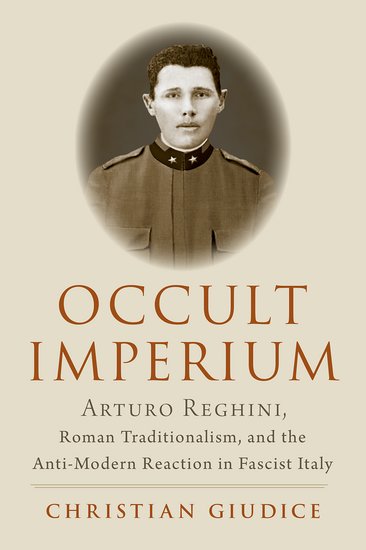Oxford University Press is announcing that it’ll be publishing Christian Giudice’s Occult Imperium: Arturo Reghini, Roman Traditionalism, and the Anti-Modern Reaction in Fascist Italy this coming November as part of the Oxford Studies in Western Esotericism series. The publisher’s description says:
- Demonstrates an alternative interpretation of Occultism as anti-modern and anti-progressive
- Provides the first comprehensive overview of the Italian esoteric milieu, from the Risorgimento, to the Great War, to Mussolini’s regime, ending with the WWII period
- Includes previously unavailable English translations of works by Reghini, Armentano, Evola, Parise, Guénon, and many others
pre-order: https://global.oup.com/academic/product/occult-imperium-9780197610244?cc=us&lang=en.



The threat posed by lone actors ranks high on the list of terrorism-related security concerns. In recent years especially, discussions about these perpetrators have focused primarily on those associated with, or inspired by, Islamic State and other jihadist entities. However, a significant portion of lone actors actually hail from right-wing extremist milieus. This article serves to draw attention to this subcategory of lone-actor terrorists, with a particular focus on their backgrounds and pre-attack behaviours. To that end, two datasets are presented that allow a comparison to be made between right-wing extremist lone actors and other ideologically-motivated lone actors. While several differences are noted, perhaps the most surprising finding is the degree of similarity between right-wing extremist lone actors and those adhering to different ideological currents. The results contribute to a knowledge-base that can inform discussion about whether risk assessment tools and protocols should differentiate between ideological categories of lone actor terrorists. The scholarship on the far right has often interpreted nativist organizations as straddling the conceptual space between party and movement. These groups contest elections in order to gain representation in office, yet they also seek to mobilize public support to engage contentious issues like social movements. Despite theoretical commonalities, very little empirical research has focused on far-right movement parties as collective actors operating both in the protest and the electoral arenas. The article redresses this inconsistency by exploring the organizational and strategic configuration of two far-right collective actors-the Hungarian Jobbik and the Italian CasaPound. Deploying original interviews with high-ranking officials, the analysis enhances our understanding of the internal supply side of the far right as well as empirical knowledge on hybrid organizations that emerge from grassroots activism and successively organize to pursue the electoral option.